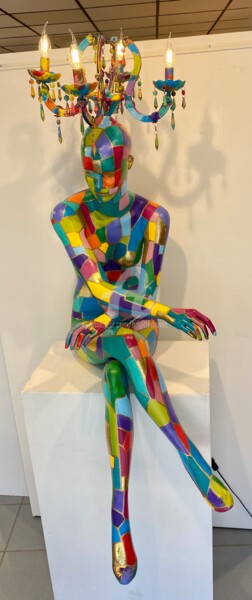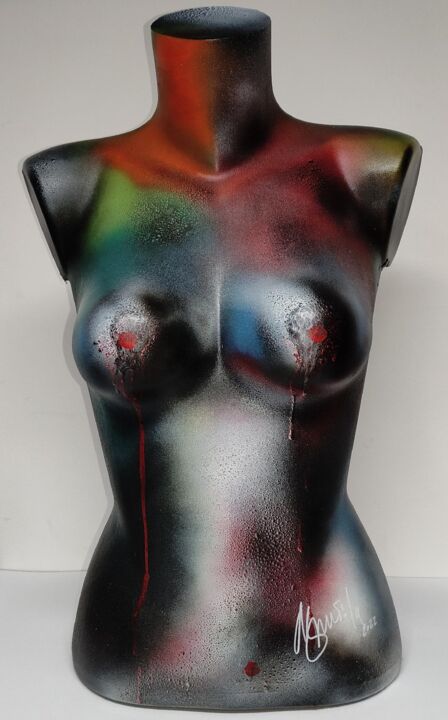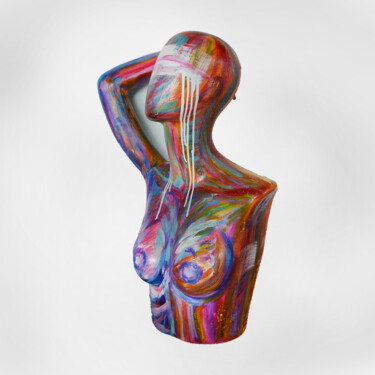
3 原始当代雕塑待售:
如何定义波普艺术风格 ?
波普艺术是一种艺术运动,最早出现于 50 年代,并于 1960 年代在美国和英国达到顶峰,从流行和商业文化中汲取灵感。它最初是对流行的艺术、文化和艺术应该是什么的理论的回应。年轻的艺术家认为,他们在艺术学校学到的东西和在博物馆里观察到的东西与他们的日常生活或周围环境没有多大关系。相反,他们采用好莱坞电影、流行文化(包括漫画书、广告、产品包装和其他商业媒体)中的意象,与传统艺术技术截然不同,创作出最真实地反映日常生活的绘画和雕塑。波普艺术已经发展成为最具影响力的当代艺术运动之一,这可能是因为包含了商业意象。
通过使用来自流行和大众文化的图像,该运动向高雅艺术传统提出了挑战。通过在艺术中使用来自流行文化的图像,通常是通过讽刺,它强调了任何文明的平庸或基本元素。它还必须处理艺术家用于机械复制或描绘的方法。在波普艺术中,元素偶尔会被明显地孤立、组合或从它们通常的上下文中移除。
随着时间的推移,艺术趋势发生了无数次变化,每一次,艺术家们都会创作出新的和创新的艺术作品。每一项创造性的努力都在向过去致敬,同时通过发明新形式为未来铺路。波普艺术运动开创了高雅文化与低俗文化的融合,并创造了一些 20 世纪最令人难忘的艺术作品。来自欧洲各地(包括法国、英国、意大利、瑞典和美国)的艺术家对绘画和雕塑进行了革命性的改革,他们展示了以前从未被认真对待过的普通、批量生产的物品,作为艺术的主题或内容。
最著名的波普艺术艺术家包括罗伊·利希滕斯坦、基思·哈林、罗伯特·劳森伯格、理查德·汉密尔顿、安迪·沃霍尔、大卫·霍克尼、罗伯特·印第安纳、詹姆斯·罗森奎斯特、亚历克斯·卡茨和村上隆。
波普艺术雕塑
波普艺术运动试图通过创作流行文化偶像的绘画和雕塑来模糊“高级”艺术和“低级”文化之间的区别。波普艺术最有影响力的方面之一是认为没有文化等级,艺术可以从任何来源借鉴。想要购买波普艺术的人都知道,不那么受欢迎的材料已经取代了木材或青铜等“高贵材料”,并与日常用品融为一体。这为波普艺术雕塑开辟了新的可能性,并导致了我们今天所知的发展。
罗伯特·印第安纳 (Robert Indiana) 的 LOVE 雕塑无疑是该运动最知名的艺术作品,还有安迪·沃霍尔 (Andy Warhol) 的雕塑布里洛 (Brillo) 和坎贝尔 (Campbell) 的番茄汁盒,它们如此有力地震撼了艺术界并突破了构成艺术的极限,但软雕塑等其他成就Claes Oldenburg 代表具有巨大尺寸的日常物品,极大地参与了运动的发展。乔治西格尔、杰夫昆斯甚至理查德奥林斯基等其他雕塑家也将在波普艺术雕塑的历史上留下印记。
波普艺术雕塑家
爱德华多·保罗齐 (1924 - 2005)
英国战后先锋派的重要人物是苏格兰雕塑家和艺术家 Eduardo Paolozzi。他被认为是波普艺术的早期先驱之一。他的拼贴画“我曾是有钱人的玩物”,结合了流行文化元素,包括低俗小说封面、可口可乐广告和征兵海报,成为波普艺术运动的重要基础作品。这件作品是英国波普艺术阴暗面的一个很好的例子,它更侧重于美国流行文化的闪光和财富与英国现实的经济和政治苦难之间的对比。松散附属的 Independent Group 成员 Paolozzi 强调了技术和大众文化对高雅艺术的影响。尽管他在整个职业生涯中从事过许多其他媒体工作,并且总是将自己的作品称为超现实主义艺术,但他与雕塑的联系更加紧密。
克拉斯·奥尔登堡 (1929 - 2022)
美国雕塑家 Claes Oldenburg 以其在公共艺术装置中使用的日常物品的大型复制品而闻名。日常物品的软雕塑版本是他作品中的另一个重要主题。奥尔登堡以创作幽默可笑的食物和无生命物体雕塑而闻名。他著名的此类作品收藏首次在艺术家 1961 年纽约下东区名为“The Store”的装置中展出。奥尔登堡制作了草莓脆饼和蜜饯苹果作为该项目的石膏雕塑。 Oldenburg 的装置像传统的杂货店一样设置,除了复制消费品外,还以低价出售他的商品,表达了艺术品与商品之间的关系。 “The Store”中的雕塑是精心手工打造的,尽管它们看起来像是批量生产的,而 Pastry Case 中覆盖物体的丰富、富有表现力的笔触似乎模仿了抽象表现主义的严肃性,这是一个流行的话题流行艺术。在一个极具讽刺意味的场景中,奥尔登堡将商品与情感表现主义的姿态融为一体。
罗伯特·印第安纳 (1928 - 2018)
美国艺术家罗伯特印第安纳是波普艺术运动的一部分。 1964 年,他以一张卡片的形式送给艺术界的各种朋友和熟人,最初开发了他的标志性形象 LOVE。1965 年,罗伯特·印第安纳 (Robert Indiana) 受邀为现代艺术博物馆的年度圣诞贺卡创作一幅艺术品。基于在他的 LOVE 图片上,印第安纳州提交了三个 12" 方形布面油画变体。博物馆选择红色、蓝色和绿色作为最强大的色彩组合。它迅速升至博物馆有史以来最受欢迎卡片的首位1966 年,印第安纳州与 Multiples, Inc. 的玛丽安·古德曼 (Marian Goodman) 合作,在继续打造他的 LOVE 系列的同时,创作了他的第一个铝制 LOVE 雕塑。印第安纳州于 1970 年完成了他的第一个巨大的 LOVE 雕塑,采用的是 Cor-Ten 钢。
乔治西格尔 (1924 - 2000)
美国画家和雕塑家乔治西格尔是波普艺术运动的一部分。尽管西格尔的艺术生涯始于画家,但他最出名的是他的真人大小的人物模型和他们出现的场景。西格尔发明了石膏绷带(用于制作骨科模型的石膏浸渍纱布条)作为雕塑媒体的使用代替传统的铸造方法。
玛丽索 (1930 - 2016)
虽然男性主导着美国波普艺术,但包括 Marisol 在内的一些女性与他们一起参加了展览。然而,她的创作并不总是遵循流行的刻板形象。她的块状惰性雕塑巧妙地参考了时尚、家庭和电影明星,以融合民间艺术和组合而闻名。
贾斯珀·约翰斯(生于 1930 年)
贾斯珀·约翰斯 (Jasper Johns) 是世界上最著名的在世艺术家之一。从 20 世纪 50 年代至今,几乎所有的艺术运动都受到他在绘画、雕塑和版画方面的影响,包括抽象表现主义、新达达主义和波普艺术运动。约翰斯是帮助波普艺术运动拥抱消费社会的艺术家之一。他的波普艺术作品主要以旗帜、目标和地图等标志为特色。实际上,波普艺术运动中最著名的作品之一《旗帜》是他最著名的作品。据信他是在梦中看到美国国旗后成功的。他的作品不断在拍卖和拍卖中获得数百万美元的成交价,并经常创下在世艺术家作品的最高成交价记录。
杰夫·昆斯(生于 1955 年)
美国艺术家杰夫·昆斯 (Jeff Koons) 以其处理流行文化的作品和以日常物品为主题的雕塑而闻名,例如由不锈钢制成、表面经过镜面处理的气球动物。他的雕塑作品屡获高价,其中至少有两件作品刷新了在世艺术家作品的拍卖纪录:2013 年的《气球狗(橙色)》以 5840 万美元成交,2019 年的《兔子》以 9110 万美元成交。
基思·哈林 (1958 - 1990)
美国艺术家基思·哈林 (Keith Haring) 的波普艺术起源于 80 年代纽约市的涂鸦场景。他的动画美学已经发展成为一种著名的视觉语言。他的大部分艺术作品都包含性暗示,这些暗示通过使用图像来提高对艾滋病的认识和安全性行为,从而转化为社会行动。由于他在纽约市地铁光秃秃的黑色广告位上自发地粉笔画人、狗和其他程式化的图案,哈林的名声越来越大。成名后,他创作了充满活力的大型壁画,其中有几幅是受委托创作的。 1982 年至 1989 年间,他创作了 50 多件公共艺术作品,其中许多免费提供给医院、日托中心和学校。 1986 年,他开设了 Pop Shop,扩大了他的实践。通过他自己的肖像,他后来的作品经常表达政治和社会学主题——反毒品、反种族隔离、安全性行为、同性恋和艾滋病。
裸体 ”为主题的艺术品
正如从古代流传下来的雕像所证明的那样,最简单的人体一直是雕塑家取之不尽的灵感来源。除了中世纪的宗教影响在裸体上蒙上朴素的面纱,然后被认为是可耻的和“罪”的代名词,裸体一直是一种旨在突出和颂扬美的雕塑。以学术或更色情的方式描绘人体。雕塑中的裸体,无论是男性还是女性,首先是静止姿势或运动中剪影的正确表现,四肢对称性的工作,比例的准确性,通过或多或少具有暗示性的姿势。在迄今为止著名的裸体雕塑中,我们可以提到例如米开朗基罗的《大卫》、奥古斯特·罗丹的《思想者》或著名的米洛维纳斯。
如何在线购买裸体雕塑?
世界各地的艺术家从一开始就从女性或男性的身体中汲取灵感。在艺术史上,具象、超现实主义或抽象的裸体和肖像一直存在。
有很多方法可以通过使用裸体艺术品或描绘裸体的雕塑来表达您的宗教信仰。
裸体雕塑可能是单调和传统的,但根据艺术家的审美,它们也可以是超现代的。在当今的艺术世界中,雕塑家擅长创作涵盖整个身体的艺术作品。看到裸体雕像,你会爱上它们。
在线购买裸体雕塑时,主题和设计一样是最重要的考虑因素之一。收藏家购买雕塑是因为他们被艺术品的美丽所感动。由于时事、文化、历史或宗教,一些艺术爱好者更喜欢在众多雕塑中购买裸体雕像。
Artmajeur 有大量可供出售的裸体雕塑。
在线艺术画廊是在几分钟内购买裸体雕塑的好地方。在做一些研究之后,您可以像购买任何其他商品一样在互联网上购买任何裸体雕塑。
通过互联网购买雕塑有几个好处,包括您不必去画廊就可以节省时间和金钱。从艺术网站,您可以订购艺术品并将它们送到您的家中或办公室。抽象或具象的裸体雕塑会让您的客厅看起来令人惊叹,您会很高兴将它添加到您家的装饰中。
您可以通过在线购买裸体雕塑来省钱。
要缩小您在我们网站 artmajeur.com 上的选择范围,请从与您的其他室内设计相得益彰的各种尺寸和颜色开始。
事实上,您可以按大小从小到大对裸体雕像进行分类。
如果您比较交货和价格,在线购买雕塑可能会很容易。谈到艺术,收藏家是最好的知识来源。如果您知道艺术品的标题和艺术家,您可以使用此功能快速选择最好的替代品。运费包含在所列价格中。在购买之前检查运输方式是必不可少的。此处还介绍了 Artmajeur 艺术品销售的条款和条件。在这里,没有什么新东西要学。如果您不满意,您也可以随时归还原始雕塑。
从时间和金钱两方面来说,在线购买裸体雕塑是最好的选择。
Discover contemporary artworks on Artmajeur
Contemporary art is a vibrant constellation of artistic expressions. This creative universe encompasses a wide array of mediums, from paintings, sculpture, and photography to drawing, printmaking, textile art, and digital art, each medium a star shining with its own distinct radiance. Artists use diverse supports and materials to bring their visions to life, such as canvas, wood, metal, and even innovative digital canvases for the creation of virtual masterpieces.
A contemporary painting, for instance, may weave its story through the masterful strokes of acrylic or oil, while a contemporary sculpture might sing its song in the language of stone, bronze, or found objects. The photographic arts capture and manipulate light to produce striking images, while printmaking employs techniques like lithography and screen-printing to produce multiples of a single, impactful image. Textile art plays with fabrics and fibers, whereas digital art pushes the boundaries of creation with innovative technology.
The allure of contemporary art lies in its boundary-pushing nature, its relentless quest for experimentation and its constant reflection of the evolving human experience. This boundless creativity, coupled with its strong social and personal commentary, makes every piece of contemporary art a unique emblem of its time, a mirror held up to the realities and dreams of our complex world. It whispers to us, moves us, provokes thought, and kindles a deep emotional response, stirring the soul of anyone willing to listen. It is, indeed, the language of emotions and ideas, spoken in the dialect of our era.

©2023 Brigitte Dravet
Origins and history of contemporary art
The story of contemporary art unfolds in the mid-20th century, marked by seismic shifts in artistic expression. Post-World War II, around the 1950s and 1960s, artists began experimenting beyond traditional confines, challenging the norms of what art could be. This revolutionary epoch birthed myriad new movements and artistic forms such as abstract expressionism, pop art, and minimalism. Paintings, once confined by realism, embraced abstraction, as artists used color and form to express emotions and ideas. Notable periods like the advent of pop art in the late 1950s and early 1960s saw artworks mimicking popular culture and mass media, reflecting society’s shifting focus.
The sculptural arts, too, witnessed a metamorphosis. Sculptors started to experiment with new materials and forms, often creating artworks that interacted with the viewer and the surrounding space, fostering a sense of engagement. Drawing, a timeless practice, also evolved, with artists incorporating innovative techniques and concepts to redefine its role in contemporary art.
Photography, a relatively new medium, emerged as a powerful tool in the contemporary art landscape. Born in the 19th century, it truly came into its own in the latter half of the 20th century, blurring the lines between fine art and documentation. Printmaking, a practice dating back to ancient times, saw renewed interest and experimentation with techniques like lithography, etching, and screen printing gaining prominence.
The realm of textile art expanded dramatically, as artists began to appreciate the versatility and tactile quality of fabric and fibers. Artists began using textiles to challenge the boundaries between fine art, craft, and design.
The dawn of digital technology in the late 20th century heralded a new age for contemporary art. Digital art emerged as artists started leveraging new technologies to create immersive, interactive experiences, often blurring the line between the virtual and the physical world.
Through these transformative periods, the essence of contemporary art has remained the same: a dynamic, evolving reflection of the times we live in, continually pushing boundaries and embracing the new, always questioning, always exploring.

©2024 Antonella Castrovillari
Evolutions of theses contemporary works in the art market
As we navigate through the 21st century, the dynamic landscape of contemporary art continues to evolve and expand, reflecting our ever-changing world. Contemporary paintings, once primarily confined to two-dimensional canvases, now embrace a multitude of forms and techniques, ranging from mixed media installations to digital creations, each piece a rich a weaving of thoughts, emotions, and narratives. Sculpture, too, has ventured far beyond traditional stone and bronze, with artists incorporating light, sound, and even motion, embodying the ephemerality and flux of the modern world.
Photography, in the hands of contemporary artists, has expanded its horizons, seamlessly blending with digital technology to create breathtaking imagery that challenges our perception of reality. Drawing, as well, has transcended the borders of paper, incorporating multimedia elements and exploratory techniques to redefine its role in the artistic discourse. Printmaking continues to flourish, with contemporary artists using traditional methods in innovative ways to deliver potent social and personal commentaries.
Textile art, once considered a craft, now holds a prominent place in the contemporary art world, with artists using it to explore issues of identity, tradition, and cultural heritage. Meanwhile, digital art, the newest member of the contemporary art family, has revolutionized the way we create and interact with art, presenting immersive experiences that blur the boundary between the virtual and the physical.
These diverse forms of contemporary art hold significant value in the current art market, not only due to their aesthetic appeal but also their ability to encapsulate and communicate complex ideas and emotions. Collectors, curators, and art lovers worldwide seek these works, drawn to their inherent dynamism, their innovative use of materials, and their eloquent expressions of our shared human experience. As a testimonial to our times, these contemporary artworks encapsulate the pulse of our society and the resonance of individual voices, forever etching our collective narrative into the annals of art history.

©2022 Antonio Zamariola
Famous Contemporary Artists
As we delve into the vibrant realm of contemporary art, we encounter an array of artists who shape this dynamic field. Each a master in their medium - painting, sculpture, photography, drawing, printmaking, textile, or digital art - they push artistic boundaries, reflecting our era and challenging perceptions. Let’s explore these remarkable contributors and their groundbreaking works.
1. Gerhard Richter - Known for his multi-faceted approach to painting, Richter challenges the boundaries of the medium, masterfully oscillating between abstract and photorealistic styles. His works, whether featuring squeegee-pulled pigments or blurred photographic images, engage in a fascinating dialogue with perception.
2. Jeff Koons - A significant figure in contemporary sculpture, Koons crafts monumental pieces that explore themes of consumerism, taste, and popular culture. His iconic balloon animals, constructed in mirror-polished stainless steel, captivate with their playful yet profound commentary.
3. Cindy Sherman - An acclaimed photographer, Sherman uses her lens to explore identity and societal roles, particularly of women. Renowned for her conceptual self-portraits, she assumes myriad characters, pushing the boundaries of photography as a medium of artistic expression.
4. David Hockney - Hockney, with his prolific output spanning six decades, is a pivotal figure in contemporary drawing. His bold use of color and playful exploration of perspective convey an intoxicating sense of joy and an unabashed celebration of life.
5. Kiki Smith - An innovative printmaker, Smith’s work explores the human condition, particularly the female body and its social and cultural connotations. Her etchings and lithographs speak to universal experiences of life, death, and transformation.
6. El Anatsui - A master of textile art, Anatsui creates stunning tapestry-like installations from discarded bottle caps and aluminum scraps. These shimmering, flexible sculptures blend traditional African aesthetic with contemporary art sensibilities, speaking to themes of consumption, waste, and the interconnectedness of our world.
7. Rafael Lozano-Hemmer - A leading figure in digital art, Lozano-Hemmer utilizes technology to create interactive installations that blend architecture and performance art. His work, often participatory in nature, explores themes of surveillance, privacy, and the relationship between people and their environments.
Notable contemporary artworks
The contemporary art landscape is a dynamic patchwork of diverse expressions and groundbreaking ideas, each artwork a unique dialog with its audience. Here are a selection of some renowned contemporary artworks, spanning various media such as painting, sculpture, photography, drawing, printmaking, textile art, and digital art, that have profoundly influenced this vibrant movement.
"Cloud Gate" by Anish Kapoor, 2006 - This monumental stainless steel sculpture, also known as "The Bean," mirrors and distorts the Chicago skyline and onlookers in its seamless, liquid-like surface, creating an interactive experience that blurs the line between the artwork and the viewer.
"Marilyn Diptych" by Andy Warhol, 1962 - An iconic piece of pop art, this silkscreen painting features fifty images of Marilyn Monroe. Half brightly colored, half in black and white, it reflects the dichotomy of celebrity life and its influence on popular culture.
"Rhein II" by Andreas Gursky, 1999 - This photographic artwork, a digitally-altered image of the Rhine River, is celebrated for its minimalist aesthetic. It strips the landscape to its bare essentials, invoking a sense of tranquility and vastness.
"Black Square" by Kazimir Malevich, 1915 - A revolutionary painting in the realm of abstract art, this piece, featuring nothing more than a black square on a white field, challenges traditional notions of representation, symbolizing a new era in artistic expression.
"Puppy" by Jeff Koons, 1992 - This giant sculpture, a West Highland Terrier blanketed in flowering plants, explores themes of innocence, consumer culture, and the interplay between high art and kitsch. It’s a delightful blend of traditional sculpture and garden craft.
"Re-projection: Hoerengracht" by Ed and Nancy Kienholz, 1983-1988 - A room-sized tableau representing Amsterdam’s red-light district, this work combines elements of sculpture, painting, lighting, and found objects. It engages viewers in a stark commentary on commodification and objectification.
"Untitled" (Your body is a battleground) by Barbara Kruger, 1989 - This photomontage, combining black-and-white photography with impactful text, explores issues of feminism, identity, and power. Its potent, confrontational message is a prime example of the power of text in contemporary visual art.
"For the Love of God" by Damien Hirst, 2007 - This sculpture, a platinum cast of a human skull encrusted with 8,601 diamonds, probes themes of mortality, value, and the human fascination with luxury and decadence. It’s a compelling blend of macabre and magnificence.
"Physical impossibility of Death in the Mind of Someone Living" by Damien Hirst, 1991 - This artwork, featuring a tiger shark preserved in formaldehyde, blurs the line between traditional sculpture and biological specimen. It prompts viewers to contemplate mortality and nature’s ferocity.
"One and Three Chairs" by Joseph Kosuth, 1965 - A piece of conceptual art, it presents a physical chair, a photograph of a chair, and a dictionary definition of a chair, thus exploring the relationship between language, picture, and referent in art.
These pieces, in their diversity, exemplify the rich tapestry of contemporary art, each piece a unique commentary on our world and a testament to the limitless potential of creative expression.



